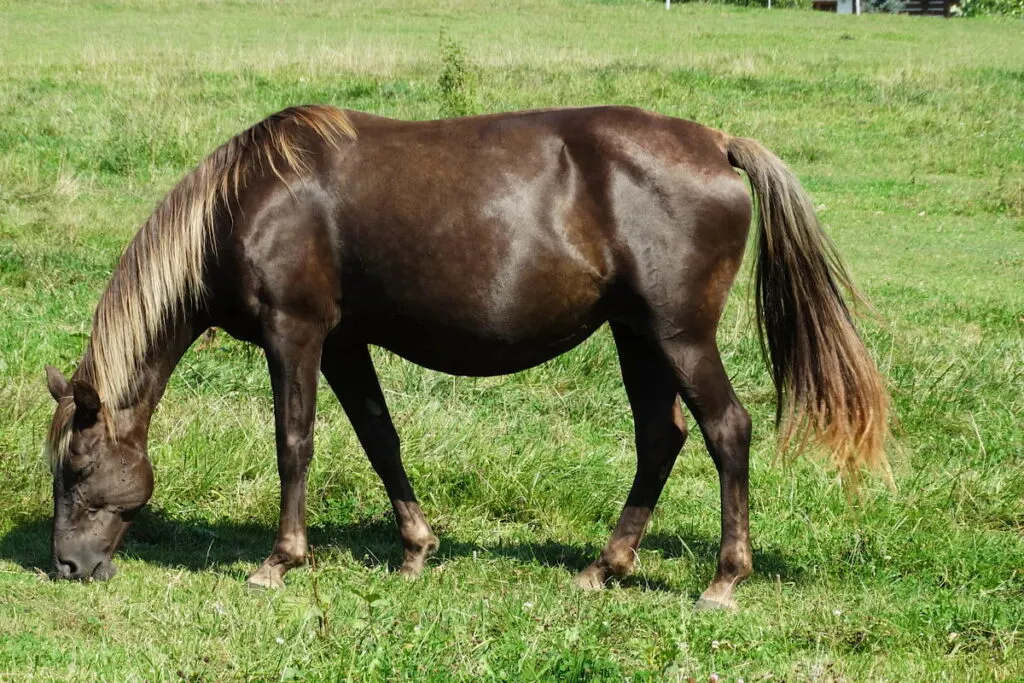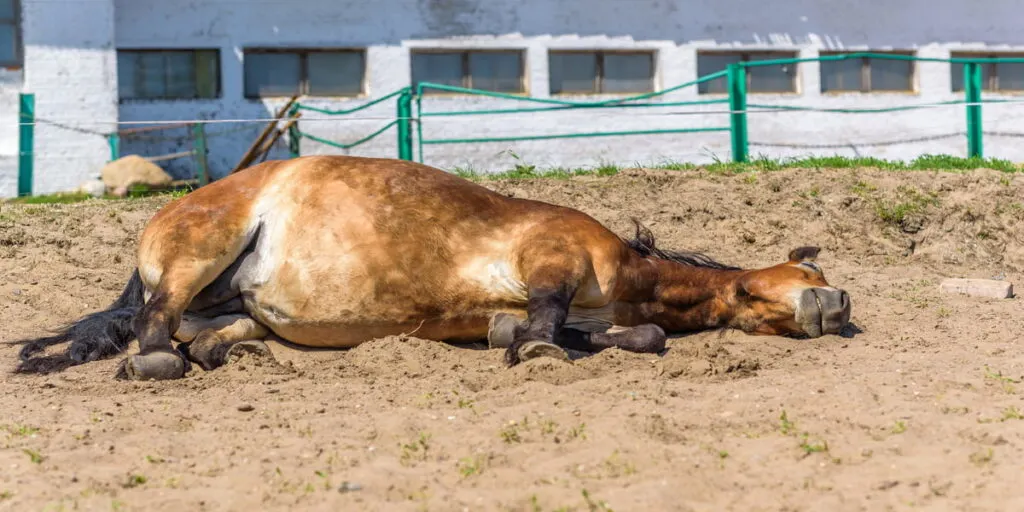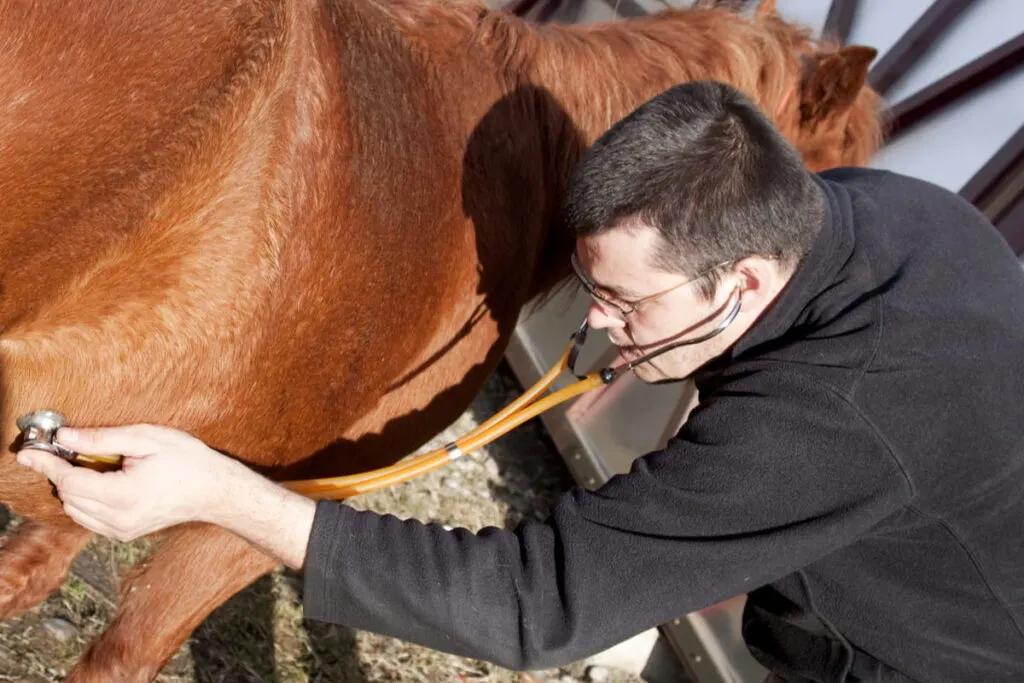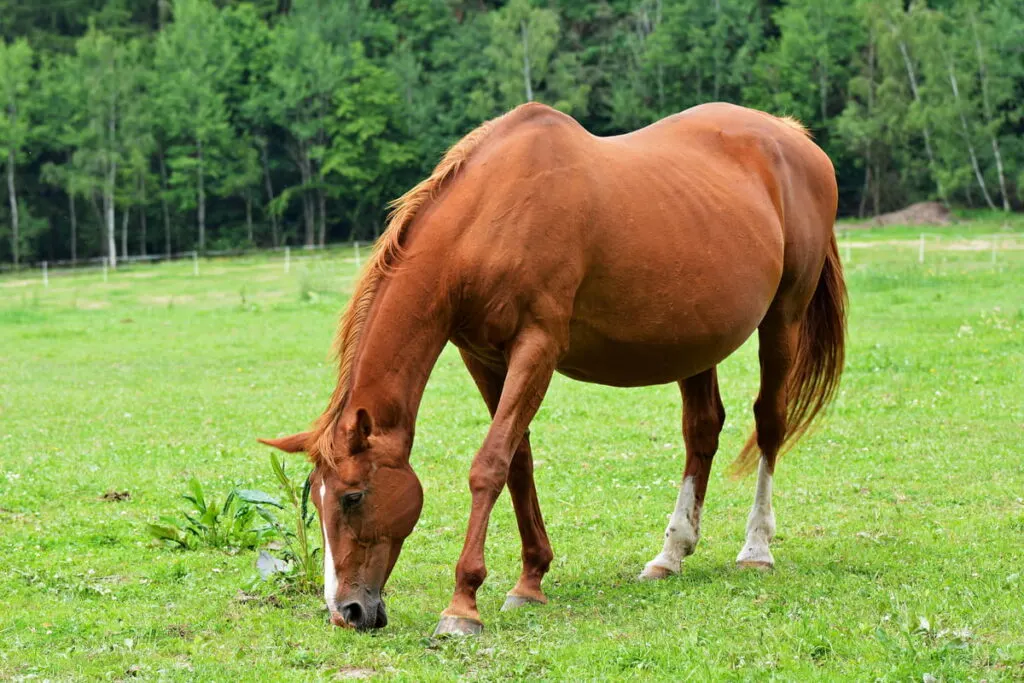Having a pregnant horse is a true adventure, although being able to tell that your horse is actually pregnant can be more complicated than you might imagine.
Just because a horse conceives does not mean that you can tell if she is pregnant just by looking at her. If you suspect your horse is pregnant, there are several signs to look out for. The following are 11 signs that a horse is pregnant.

Table of Contents
The Mare Does Not Go Back into Estrus
One clear sign that your horse may be pregnant is that it does not go back into its estrus cycle. The estrus cycle is when a female horse can potentially conceive if a stallion successfully mates her.
A pregnant horse will not go back into estrus, or back “in heat.”
There are times when a horse does not go into heat, but it does not mean conclusively that she is pregnant. Sometimes mares will skip cycles altogether, or the time between cycles may be longer than usual.
So a skipped estrus cycle is not a definite sign, but it is a possible sign that a horse is pregnant.
The Mare Gains Weight in the Abdominal Region
If your mare is noticeably gaining weight in its stomach area, that could be a positive sign that your horse is pregnant.
While weight gain in a female horse does not always point to pregnancy, it can indicate it.
A horse can gain weight for a variety of reasons, including a change in food, a change in the quality of hay or grass, or even lack of exercise. Be sure to rule out all other causes before assuming pregnancy.
A mare will usually not begin gaining weight in her abdominal area immediately after conceiving, and it may take a while for the weight gain even to be visible.
You may not even notice your horse has gained any weight until the fifth or sixth month of pregnancy.

The Mare is No Longer Interested in the Stallion
Another sign that a horse is pregnant is that it is no longer interested in the stallion like it was before.
Once a horse has conceived, there is little to no reason to show any interest or anger towards a male horse.
A pregnant horse will not only appear uninterested, but it will often appear indifferent altogether to the presence of a male horse.
This alone is not a concrete sign that a horse is definitely pregnant, but it is a step in the right direction.

The Mare is Acting Differently
Mood swings are normal for any mammal that is pregnant, and horses are no exception. You may notice your mare acting differently or being more tired than usual.
This is not a clear-cut sign that a mare is pregnant, but it is a normal part of pregnancy in a horse. The mare may appear uncomfortable or just not as enthusiastic as it was in prior months.
The closer a horse gets to the delivery date, the more moody and uncomfortable she may become. You may even notice her kicking or biting towards her own stomach.
The Mare Will Not Shake Its Whole Body
Another sign that a horse is pregnant is that it will not shake its whole body when it shakes. There may be no scientific proof for this one, and you will not see it in the medical journals, but many equestrians swear by it.
If you have ever seen a horse shake, they usually shake their whole body from their head to their hind. The theory is that a pregnant horse will often not shake its entire body, only its head.
Horse owners will tell you time and again that a pregnant horse will not shake its entire body as a non-pregnant one will.
This may be true for some horses; however, keep in mind that just because a horse does shake its whole body, that does not necessarily mean it is not pregnant.
The Mare is Producing Equine Chorionic Gonadotrophin
A much more scientific sign that a horse is pregnant is that it is producing the equine chorionic gonadotrophin (eCG) hormone.
A pregnant horse will produce the eCG hormone between the 45th and 90th days of pregnancy.
A confirming sign that a horse is pregnant is that the eCG hormone is present in its blood sample.
Veterinarians or, in some cases, even horse owners can test for the hormone if it is within the short time frame mentioned above.
An Ultrasound Shows a Growing Foal
A surefire sign that will confirm that a horse is pregnant is that you can see the foal when using an ultrasound machine. The ultrasound probe checks for the presence of a foal through the rectum.
There is some inherent danger in checking for pregnancy using a rectal ultrasound probe, so it is important that only experienced professionals perform the ultrasound.
If you are looking for a reliable sign that your horse is pregnant, this may be the route you want to take.

The Foal Can be Manually Confirmed
If an ultrasound is out of the question, then another sign that your horse is pregnant is when you or a vet can feel the foal through manual confirmation.
Veterinarians and even horse owners can determine if a horse is pregnant by manually checking for a foal’s body via the rectum.
Whoever is checking will be able to feel the foal’s body inside the horse manually. This is one of the most common ways to check for pregnancy in a horse, especially if an ultrasound machine is not readily available or wanted.
A seasoned professional will be able to tell rather quickly if your horse is pregnant or not, given that it has been at least a few weeks since the possible conception.
Her Vulva is Stretching Out
Another reliable sign that a horse is very pregnant is that her private area begins to stretch and loosen.
When a horse is close to delivering a foal, you will notice that the mare’s vulva looks swollen, stretchy, and more wrinkled than before.
The vulva stretches out because the horse’s body is preparing to deliver a very large foal, so it has to loosen in preparation.
If you notice this telltale sign in your mare, know that your horse is very pregnant, and you should expect a foal in the coming weeks.
The Mare’s Udders are Swelling
One confirming sign of a highly progressed pregnancy in horses is when their udders swell.
Around a week or two before delivery, the udders on a pregnant horse will begin to fill up with milk in preparation.
If you suspect your horse has been pregnant for a while and you see her udders begin to swell, chances are she will give birth to a foal in the next few weeks. It could even happen within a few days.
Usually, by the time a horse’s udders swell, most horse owners are well aware that the horse is pregnant.
However, if the horse is a new addition to the farm, you may not have noticed the earlier positive signs of pregnancy.

You Can See the Foal Moving in the Horse’s Belly
One last positive sign that your horse is undoubtedly pregnant is that you can actually see the foal moving in the mare’s belly.
If you were unsure before, once you see and even feel the foal moving in your horse’s belly, you will no longer question the possible pregnancy.
As the foal grows, there is less and less room for the foal to move in the horse’s uterus. As a result, you can see the foal moving around in the womb towards the end of the pregnancy.
You may even notice it laying more on one side of your horse’s abdomen than the other. The horse’s swollen stomach may look a little lopsided from a distance.
Final Thoughts
Sure, the best way to know a horse is pregnant is to call a veterinarian, but several signs may steer you towards an answer until the veterinarian can confirm.
Thinking a horse is pregnant and knowing a horse is pregnant are two very different things, so sometimes you have to do your own investigation.
If you still are not sure, call in the professional. A veterinarian can tell you for sure if your horse is pregnant or not.
Resources:
I used the following sources to write this article.
